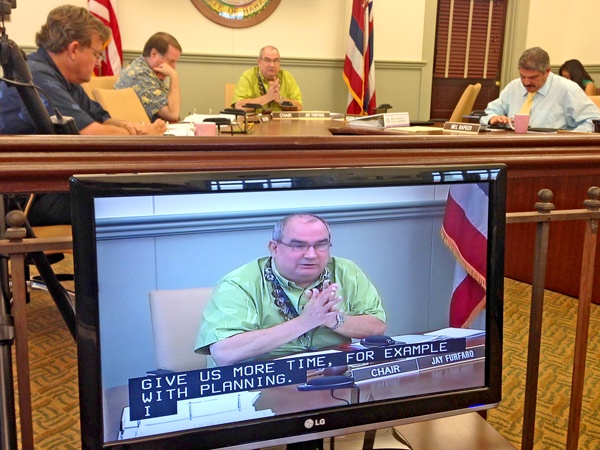LIHU‘E — After routinely ending each recent fiscal year with tens of millions of dollars with a budgetary surplus, the county may start using some of that money for a permanent rainy-day fund. But will it cost more to taxpayers?
LIHU‘E — After routinely ending each recent fiscal year with tens of millions of dollars with a budgetary surplus, the county may start using some of that money for a permanent rainy-day fund. But will it cost more to taxpayers?
Some Kaua‘i County Council members support having a back-up account, while others are concerned that this may create an additional tax burden on residents.
The proposal, which has been slowly moving through council meetings during the last three months, was deferred again on Wednesday, per request of the administration.
Bill 2457, in its current form, establishes a permanent reserve fund between 15 and 20 percent of the county’s previous-year actual expenses, including encumbrances and general fund transfers. On the flipside, going back at least four years, the administration has a surplus of more than 20 percent of the budget.
“We basically provide a cushion of 25 percent for general government expenses,” said Councilman Mel Rapozo, adding that he wasn’t sure what will be the final numbers for the proposed reserve fund. “But that reserve fund is going to be in addition to our general government budget.”
In other words, Rapozo said, the council would budget government expenses with a cushion and then provide another source of funds for the reserve fund, potentially creating another expense for taxpayers.
“What I’m saying is, we’ve go to budget tighter, we’ve got to budget more accurately,” he said.
In 2011, the council passed a resolution creating a reserve fund to be used in case of emergencies, with some restrictions.
But the resolution expired in December when the new council formation took office. By creating an ordinance through a bill, the council would make the reserve fund a permanent fixture in the administration’s operational budget.
Right now, Rapozo said, there is a “duplicate cushion,” the county’s reserve fund and the surplus. The legal thing to do, he said, would be to return the surplus to taxpayers.
Bill 2457, originally introduced Oct. 12 by Chair Jay Furfaro, allows the proposed reserve fund to be spent in the following manner: Up to 50 percent to cover operations, ensuring cash flow and working capital, up to 25 percent to stabilize the budget, up to 15 percent for initial disaster response and up to 10 percent for non-insured losses.
Furfaro said that according to general accounting principles in government, “you can never budget perfectly.” Such practices suggest that no one should be budgeting more than 12 percent, he said.
Yet, there are at least 10 county departments who have budgeted in excess of 12 percent, according to Furfaro.
“I’m happy to say that the public safety areas — police, fire and civil defense — are not on that list, as well as the council budget,” he said.
Councilman Ross Kagawa said one of the main reasons he ran for council was a concern with the way the administration is spending money.
He said he has worked for different sectors of government, including performing audits. It’s normal practice that in the last couple months of a fiscal year, department heads tell employees to spend money to make sure that there are no large variances in their budget, thus avoiding potential cuts.
“I know that this is probably happening at the county level too, and they’re still having these big variances,” Kagawa said.
“You only can buy so much paper clips and staplers and whatever.”
If lawmakers right-size government, there won’t be this problem, he said.
Councilman Tim Bynum, who is also the chair of the council’s Finance Committee, said the county’s budget has been routinely larger than real expenditures, and this is normal in any instance.
“But ours has been pretty big, and we have been discussing this in the last couple years,” he said.
Some of the variances, he said, will be there, such a legal fund in the County Attorney’s Office, to be used for special counsel.
“But we hope to not use it every year,” Bynum said of the legal funds. “So there are some variance that are OK.”
However, he said there is concurrence from the administration and the council that there is a need for a tighter budget.
The surplus goes back into the county’s general fund, said Bynum, adding that the reserve fund will put a ceiling for the first time on how much the administration can use.
The administration’s request to defer the bill came to the council on Wednesday morning, according to Bynum, who said he was “a little disappointed” with the request.
In the next few months, he said, there will be “a whole bunch of meetings” looking at the council’s financial sources and expenditures, especially because of last year’s real property tax changes.
The council deferred the bill to Jan. 23, when the administration is supposed to make a presentation at the council chambers regarding the proposal.
• Léo Azambuja, staff writer, can be reached at 245-3681 (ext. 252) or lazambuja@ thegardenisland.com.


